Organic spices stay fresh naturally because they're packed with powerful compounds that act as their own preservatives. You'll find high levels of antioxidants, antimicrobial properties, and essential oils that work together to prevent spoilage. Through careful processing methods like steam sterilization and traditional drying, these spices retain up to 95% of their natural protective compounds while eliminating harmful pathogens. Salt curing and fermentation techniques can extend their shelf life even further, with some methods preserving spices for up to two years. Understanding these natural preservation methods will reveal the full potential of your organic spices.
Natural Properties of Organic Spices

These natural properties contribute greatly to the spices' potency and health benefits.
You'll benefit from their high antioxidant activity, which often surpasses that of fruits and vegetables. The compounds in organic spices work together synergistically, offering immune system support, helping reduce illness, and potentially lowering cholesterol levels.
Spices like garlic, cumin, coriander, and rosemary contain antimicrobial properties that help protect against harmful bacteria. Without artificial interference, these beneficial properties remain intact and readily available for your body to utilize.
Steam Sterilization Benefits
Steam sterilization stands as the gold standard for preserving organic spices while guaranteeing their safety for consumption. When you choose organic spices that have undergone steam sterilization, you're getting products that are naturally clean and safe, without any chemical additives.
The process effectively eliminates harmful pathogens like salmonella, E. coli, and listeria through high-temperature, short-time processing. You'll find that this method preserves up to 95% of the spices' essential oils, maintaining their vibrant colors, robust flavors, and authentic tastes. The quick steam contact time of 20-40 seconds prevents burning while guaranteeing thorough sterilization. The exclusive dry steam device ensures moisture levels remain optimal throughout the entire process.
What makes this method particularly impressive is its versatility. Whether you're using whole peppercorns, ground turmeric, or dried herbs, steam sterilization works effectively across all forms. The integrated cooling and drying systems guarantee your spices maintain their desired texture and consistency.
You'll appreciate that steam sterilization aligns perfectly with organic principles, as it's completely natural and chemical-free. This process meets your expectations for clean-label products while protecting you from foodborne illnesses, making it the ideal choice for maintaining the freshness and safety of organic spices.
Traditional Drying Methods

Your organic spices' freshness relies heavily on proper drying methods, with sun drying offering a natural way to preserve essential flavors while maintaining quality.
You'll notice that proper air circulation during the drying process extends your spices' shelf life by preventing moisture buildup and potential mold growth.
When you control heat levels during drying, you're ensuring ideal moisture content that locks in the spices' natural compounds and prevents degradation. Traditional methods like hanging bundles upright in a cool, dry place for about two weeks yield consistently fresh results.
Sun Drying Preserves Freshness
Sun-drying stands as one of the most time-tested methods for preserving spice freshness, offering a natural way to maintain flavor while extending shelf life. When you're looking to preserve your organic spices without additives, sun-drying provides an eco-friendly solution that retains essential oils and aromatic compounds while inhibiting microbial growth.
To achieve ideal results, you'll want to spread your spices evenly on clean trays in a sunny location with good air circulation. Cover them with cheesecloth or fine mesh to protect against pests while allowing proper ventilation. The process typically takes one to three days, depending on your climate and the thickness of your spices.
Here's why sun-drying is particularly effective for preserving spice freshness:
- Maintains 15-20% moisture content, preventing both over-drying and spoilage
- Preserves natural flavors by avoiding heat damage to essential oils
- Intensifies spice potency through gentle dehydration
- Extends shelf life without requiring chemical preservatives
You'll know your spices are properly sun-dried when they've reached a consistent texture throughout. Remember to rotate them occasionally for even drying, and store them in airtight containers once they're completely dry to maintain their enhanced flavors.
Air-Flow Enhances Shelf Life
Traditional air-flow drying has emerged as a cornerstone technique for extending spice shelf life, combining centuries-old wisdom with proven effectiveness. You'll find this method particularly effective with herbs like rosemary, thyme, and sage, which you can easily bundle and hang upside down in a cool, dry space for about two weeks until they're ready for storage.
When you're dealing with larger-scale spice preservation, industrial air drying offers precise control through belt and tray dryers. You'll notice how hot air circulation removes moisture evenly, maintaining the natural flavors without requiring any preservatives. This approach works exceptionally well for Mediterranean herbs and guarantees consistent quality.
You can maximize your drying results by using specialized racks and trays that promote uniform air circulation. These structures aren't just practical – they're essential for preventing clumping in ground spices and leaf products while meeting strict hygiene standards.
For ideal results, you'll want to focus on controlling your drying environment. By managing temperature, humidity, and airflow, you're protecting essential oils and aromatic compounds while preventing mold growth.
Whether you're using hot air drying or freeze-drying methods, these controlled conditions assure your spices maintain their natural freshness.
Heat Controls Moisture Content
Building on proven air-flow techniques, thermal drying has become a cornerstone method for controlling moisture in organic spices. You'll find that precise temperature control between 50-60°C effectively reduces moisture while preserving the essential oils that give your organic spices their distinct flavors and medicinal properties.
In controlled environments, you can maintain ideal drying conditions that aren't dependent on weather variations. Using specialized equipment, you'll achieve consistent results that protect your spices' quality and extend their shelf life naturally.
Modern drying techniques offer you several advantages:
- Dehydrator systems maintain steady temperatures and airflow, preserving essential oils
- Warm air processing reduces drying time to just 2-5 minutes
- NIR technology lets you monitor moisture levels in real-time
- Controlled environments prevent unwanted biological processes
You'll notice that properly dried organic spices don't clump or develop powdery textures. By removing excess moisture through heat-controlled processes, you're effectively preventing microbial growth while maintaining the spices' natural color and flavor.
This careful moisture management guarantees your organic spices stay fresh without requiring artificial preservatives.
Salt-Based Preservation Techniques
Several salt-based preservation techniques have stood the test of time in maintaining organic spices' freshness. You'll find that salt curing effectively removes moisture from whole peppercorns and mustard seeds, creating an inhospitable environment for bacteria and mold. When you're dealing with moisture-rich spices, this method helps retain their natural flavors and textures.
| Method | Primary Use | Duration |
|---|---|---|
| Salt Curing | Whole peppercorns, mustard seeds | 6-12 months |
| Salt Brining | Whole/chopped spices in solution | 3-6 months |
| Salt Packing | Fresh herbs, leafy spices | Up to 1 year |
You can also preserve spices through salt brining, which involves submerging them in saltwater solutions. This technique's acidity preserves both texture and color while adding a tangy flavor profile. For herbs like basil and rosemary, salt packing creates a protective barrier against microbial growth. You'll get the best results by either coating herbs with salt or creating alternating layers. If you're looking to create long-lasting seasoning blends, try salt infusion by mixing herbs with salt in various ratios. This method can keep your spice mixtures fresh for up to a year while maintaining their robust flavors.
Fermentation in Spice Preservation
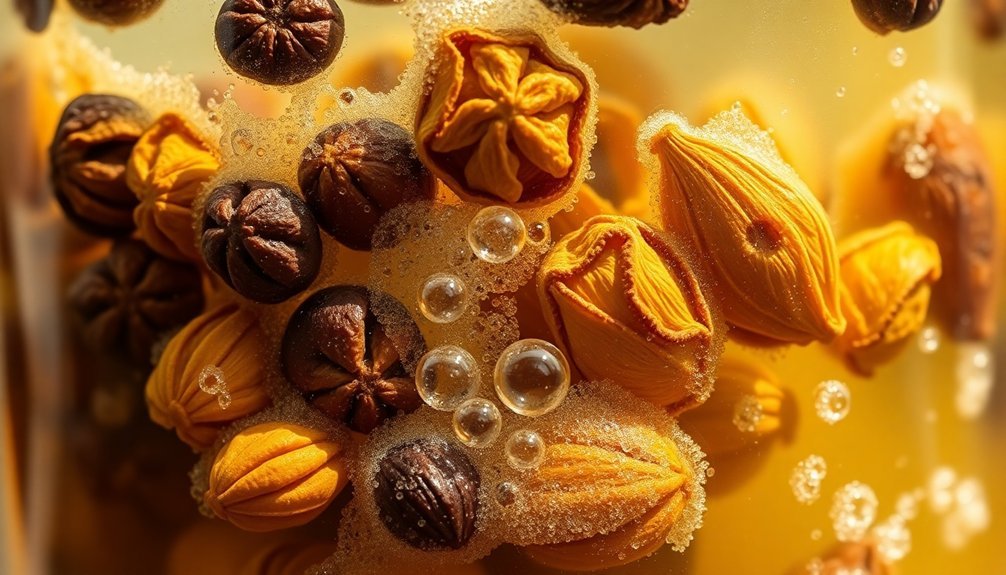
You'll find that natural fermentation offers a powerful way to preserve your organic spices while enhancing their flavors through beneficial microbial activity.
By combining salt with the right environmental conditions, you're creating an ideal setting for good bacteria to thrive and produce natural preservatives.
The fermentation process not only keeps your spices fresh but also develops complex flavor profiles that you can't achieve through other preservation methods.
Natural Fermentation Methods
Harnessing the power of beneficial microorganisms, natural fermentation offers an effective method for preserving spices while enhancing their nutritional value. You'll find that a 2% salt brine creates the perfect environment for beneficial bacteria while keeping harmful microbes at bay. This traditional preservation technique can extend your spices' shelf life for several months to two years when properly stored.
The process is straightforward but requires attention to detail. You'll need to verify your ingredients remain fully submerged in the brine or vacuum-sealed to prevent oxygen exposure.
The fermentation period typically ranges from a few days to two weeks, depending on your desired flavor profile and acidity levels.
- Create a 2% salt solution to submerge your spices
- Monitor the fermentation process by tasting and burping containers regularly
- Store fermented products in the refrigerator to slow down fermentation
- Maintain strict cleanliness and sterilize all equipment before use
You can apply this method to various ingredients, from chili peppers for hot sauces to mustard stems and wild plants.
The salt not only preserves but also helps retain the spices' natural color and flavor while creating a protective barrier against unwanted microbial growth.
Spice Flavor Enhancement
Fermentation transforms ordinary spices into flavor powerhouses through a remarkable natural process. When you submerge your spices in a brine solution, beneficial microbes create an acidic environment that not only preserves but also enhances the natural flavors. You'll notice how the fermentation process develops complex, tangy notes while maintaining the spices' original characteristics.
| Spice Type | Fermentation Time | Flavor Changes |
|---|---|---|
| Chili Peppers | 1-2 weeks | Tangy, deeper heat |
| Garlic | 2-4 weeks | Mellow, umami-rich |
| Ginger | 1-3 weeks | Complex, zesty |
| Mixed Spices | 2-3 weeks | Layered, aromatic |
You're not just preserving your spices; you're elevating their taste profile. The brine solution acts as a catalyst, allowing the spices to develop richer, more nuanced flavors while maintaining their vibrant colors and textures. You'll find that fermented spices offer enhanced nutritional benefits and can be stored longer without artificial preservatives. This natural process aligns perfectly with organic preservation methods, as it relies solely on traditional techniques that have been proven effective for generations.
Salt and Microbial Action
Salt serves as the cornerstone of successful spice fermentation through its remarkable ability to control microbial activity.
When you're fermenting spices, salt creates a selective environment where beneficial bacteria thrive while harmful microorganisms can't survive. Through osmosis, salt pulls moisture from both the spices and any unwanted bacteria, effectively controlling which microorganisms can grow.
Your spices stay fresh during fermentation because salt actively promotes the growth of beneficial lactic acid bacteria while inhibiting pathogenic organisms like Salmonella and E. coli. The salt concentration creates an environment where these helpful bacteria can produce preservative compounds, particularly lactic acid, which further protects your spices.
Here's how salt preserves your organic spices through fermentation:
- Draws out moisture through osmosis, creating an inhospitable environment for harmful bacteria
- Promotes the growth of beneficial lactic acid bacteria that produce natural preservatives
- Forms a protective barrier against spoilage organisms when used in dry applications
- Reduces water activity in spices, preventing the growth of mold and other deteriorating microorganisms
The key is maintaining proper salt concentrations and clean fermentation conditions to guarantee ideal preservation.
Bio-Preservation Through Beneficial Microorganisms
Naturally occurring beneficial microorganisms offer a powerful solution for preserving organic spices through bio-preservation techniques. These helpful bacteria, particularly lactic acid bacteria, create an environment that keeps your spices fresh by producing natural preservatives and competing with harmful microorganisms for resources.
You'll find that fermentation plays a significant role in this preservation process. When beneficial bacteria ferment the natural sugars present in spices, they produce lactic acid, which lowers the pH and creates conditions that harmful bacteria can't survive in. This natural process doesn't just preserve your spices – it can enhance their flavor and nutritional value.
| Beneficial Microorganism | Primary Function | Benefits to Spices |
|---|---|---|
| Lactobacillus | Lactic acid production | Extends shelf life |
| Leuconostoc | Competitive exclusion | Prevents pathogen growth |
| L. plantarum | pH reduction | Enhances flavor |
| L. rhamnosus GG | Nutrient competition | Improves safety |
| Probiotic strains | Biopreservation | Increases nutrients |
This bio-preservation method aligns perfectly with organic principles, as it's completely natural and free from synthetic additives. You're getting spices that stay fresh longer while maintaining their authentic flavors and nutritional benefits.
Plant-Based Antimicrobial Compounds
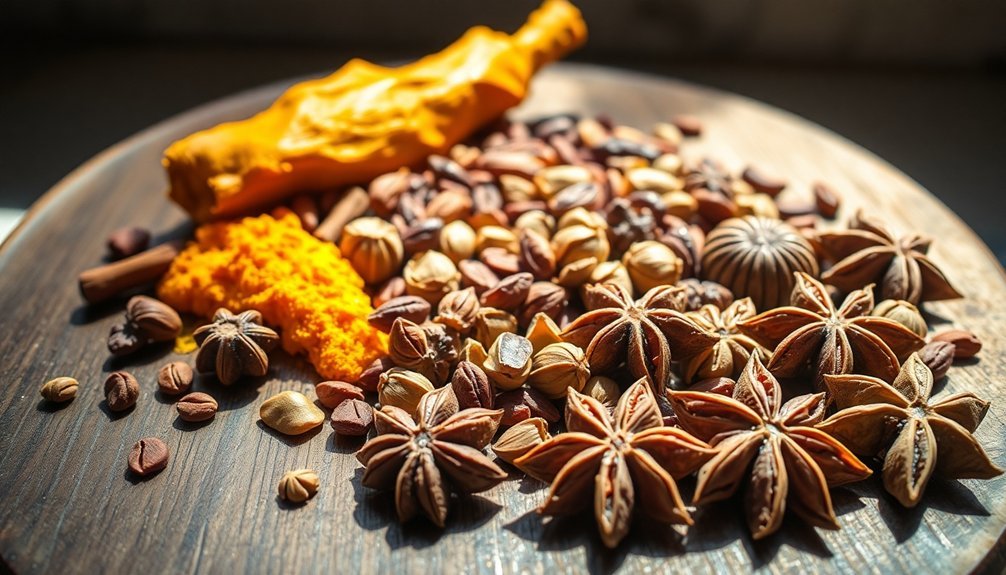
You'll find that organic spices naturally protect themselves through complex defense mechanisms, including antimicrobial compounds that ward off harmful microorganisms.
Essential oils within these spices act as powerful preservatives, with compounds like eugenol in cloves and cinnamaldehyde in cinnamon actively fighting against bacterial growth.
The phenolic compounds present in your organic spices work as natural antibacterial agents, helping to maintain the spices' freshness while providing you with safe, clean-label food preservation.
Natural Defense Mechanisms
Organic spices come equipped with powerful plant-based antimicrobial compounds that serve as their built-in defense mechanisms. You'll find that these natural compounds, like eugenol in cloves and cinnamaldehyde in cinnamon, actively work to protect the spices from harmful microorganisms, including bacteria and fungi.
These defense mechanisms operate through multiple pathways to keep your spices fresh:
- Cell membrane disruption – The compounds break down microbial cell walls, leading to their destruction.
- Metabolic interference – Natural chemicals block essential pathways that microorganisms need to survive.
- Protein binding – Active compounds attach to crucial proteins in harmful organisms, preventing their function.
- pH modification – The creation of acidic environments through fermentation inhibits unwanted microbial growth.
You're benefiting from thousands of years of plant evolution when you use organic spices. Their defense systems are remarkably effective against common threats like E. coli, S. aureus, and Listeria.
What's even more impressive is that these natural compounds don't just preserve the spices – they're also responsible for the distinct flavors and aromas you enjoy in your cooking.
Essential Oils Protect Spices
Among the most powerful defense mechanisms in organic spices are their concentrated essential oils, which serve as nature's own preservatives. These oils, like cinnamaldehyde in cinnamon and eugenol in cloves, actively protect your spices by disrupting the cell walls and metabolic processes of harmful microorganisms.
You'll find these natural antimicrobial compounds particularly effective against common food spoilage culprits. For instance, coriander's essential oils combat bacteria like Listeria monocytogenes, S. aureus, and E. coli, while piperine in pepper and curcumin in turmeric offer similar protective benefits.
What makes these essential oils especially valuable is that they're most effective when left intact within the spices. They don't just preserve – they enhance your spices' flavors and aromas while maintaining food safety standards.
This natural preservation system aligns perfectly with organic principles, as you won't need artificial additives to keep your spices fresh.
When you choose organic spices, you're getting nature's complete package: the essential oils work continuously to protect against microbial growth during cultivation, processing, and storage, ensuring your spices remain fresh and potent naturally.
Phenolic Compounds Fight Bacteria
Inside organic spices, phenolic compounds serve as powerful natural antibacterial agents, working alongside essential oils to protect against harmful microorganisms. These plant-derived compounds interact with bacterial cell surfaces, disrupting their membrane integrity and causing irreversible damage to harmful bacteria that could spoil your spices.
You'll find various types of phenolic compounds in organic spices, including flavonoids, terpenoids, and polyphenols. They're particularly effective against both beneficial and harmful bacteria, targeting pathogens like E. coli, Salmonella, and Listeria.
When you choose organic spices, these natural compounds help preserve freshness by:
- Penetrating bacterial cell membranes due to their lipophilic nature
- Binding to bacterial enzymes to weaken cell wall structure
- Coagulating cell contents to prevent bacterial reproduction
- Inhibiting intracellular enzyme function to stop bacterial growth
The phenolic compounds in your organic spices don't just fight bacteria – they also help maintain the spices' authentic flavors and aromas. This natural preservation system aligns with clean-label preferences while ensuring your spices stay fresh without artificial preservatives.
Environmental Impact on Spice Preservation
The environmental conditions surrounding spice storage and preservation play an essential role in maintaining freshness and quality.
When you're storing organic spices, you'll find that natural preservation methods work in harmony with environmental factors to extend shelf life without synthetic additives.
Sustainable preservation techniques like salt-based methods and natural antimicrobials from herbs and spices themselves help maintain quality while reducing environmental impact.
You'll notice that fermentation and bio-preservation techniques not only preserve your spices but also enhance their flavors and safety profiles through beneficial microbes.
Climate resilience plays a vital part in preservation too.
As spice farmers adapt to climate change through drought-resistant varieties and protective measures, they're ensuring more stable supplies of high-quality spices that naturally resist degradation.
The way these spices are grown – using organic farming practices, crop rotation, and agroforestry – results in stronger, more resilient products that maintain their freshness longer.
Organic Certification Standards
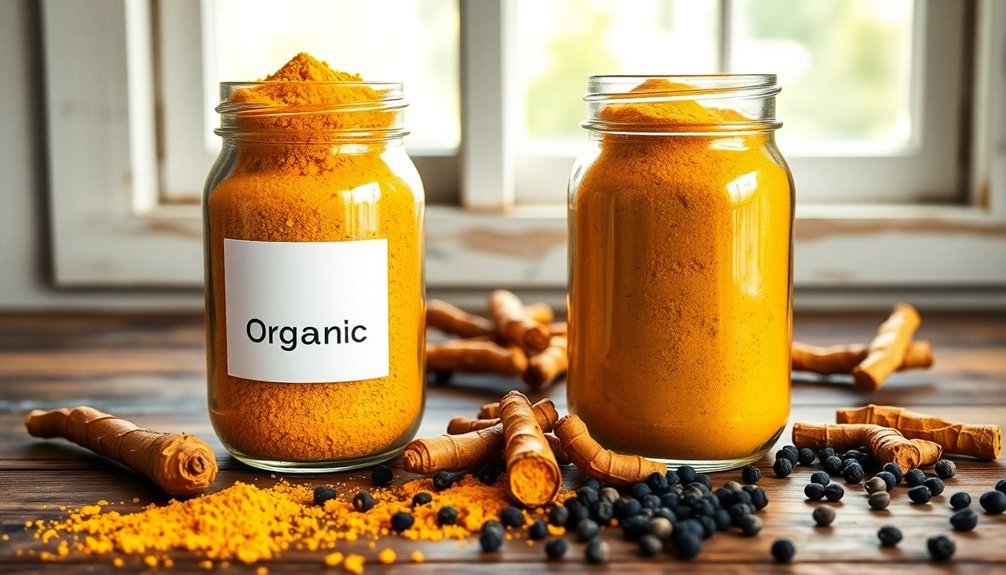
Several rigorous certification standards govern organic spice production worldwide, guaranteeing you're getting genuinely organic products that meet strict quality requirements.
When you purchase certified organic spices, you're buying products that have undergone a thorough three-year transformation period and comply with multiple international standards, including USDA NOP, EU regulations, and Japanese Agricultural Standards.
The certification process starts with local Self Help Groups and involves regular inspections to verify compliance.
You'll find that certified organic spices must meet these fundamental requirements:
- Complete absence of synthetic pesticides, chemical fertilizers, and GMOs in the production process
- Implementation of natural farming methods, including crop rotation and biological pest control
- Strict separation protocols to prevent cross-contamination with non-organic products
- Commitment to soil health and sustainable land management practices
Additional certifications like Demeter, Naturland Fair, and Fairtrade further validate the organic integrity of spices.
These standards guarantee you're not just getting chemical-free products, but also supporting sustainable farming practices that preserve soil health and biodiversity while maintaining the spices' natural freshness without artificial preservatives.
Storage and Packaging Solutions
Proper storage and packaging solutions play an essential role in maintaining your organic spices' freshness and potency. When you're choosing storage containers, opt for glass jars or metal containers, as they provide superior protection against oxygen and moisture compared to plastic alternatives. These non-porous materials help preserve your spices' natural flavors and aromas without the need for artificial preservatives.
You'll want to store your organic spices in a cool, dark place away from heat sources and direct sunlight. Keep them separate from strong-smelling foods to prevent unwanted odor transfer. For ideal organization, consider using clear labels and arranging your spices alphabetically or by frequency of use.
If you're dealing with limited kitchen space, magnetic jars or wall-mounted shelves can be practical solutions.
When it comes to packaging, look for options with reliable sealing mechanisms. Heat-sealed bags and stand-up pouches with resealable features offer excellent protection against moisture while maintaining accessibility.
You might also consider eco-friendly packaging materials that align with organic principles. Remember to maintain consistent storage temperatures and always keep containers tightly sealed to prevent moisture accumulation.
Quality Control Measures
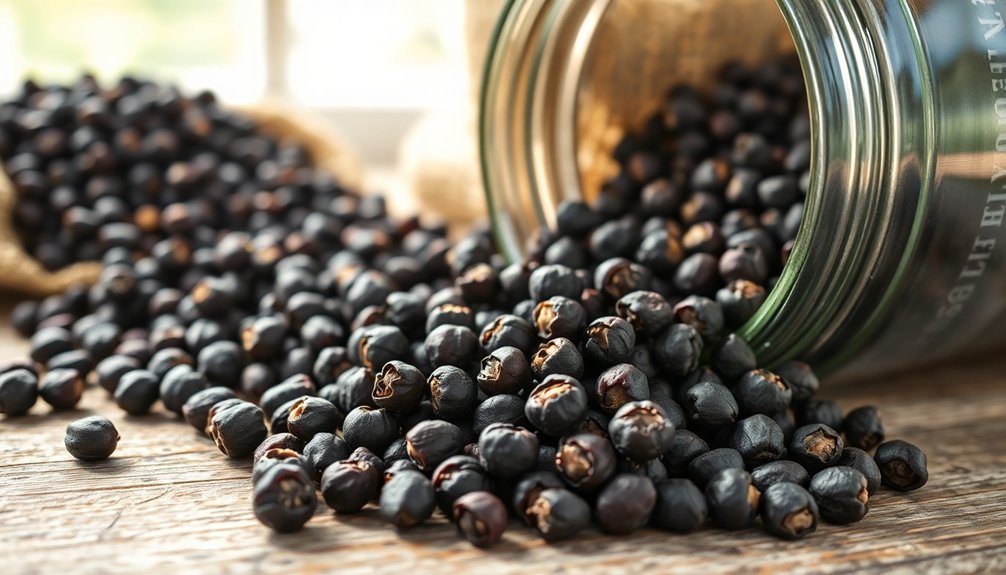
While storing your organic spices correctly helps maintain their quality, implementing rigorous quality control measures guarantees you're getting authentic, pure products from the start. These measures begin at the farm level, where geographic authenticity and cultivation practices undergo strict verification to confirm you're receiving genuine organic spices grown without synthetic pesticides or fertilizers.
The quality control process involves multiple stages of inspection and testing:
- Origin verification and farming practice assessment to confirm organic cultivation methods, including companion planting and natural pest management.
- Thorough testing for adulterants, pesticide residues, and heavy metals using advanced analytical techniques.
- Multi-stage cleaning and sorting processes utilizing automated systems, magnets, and specialized sieves to remove foreign materials.
- Temperature-controlled grinding methods, including cryogenic processing, to preserve essential oils and flavor compounds.
Each stage works together to deliver pure, unadulterated spices that maintain their natural properties without artificial preservatives.
Through pneumatic handling and automated mixing processes, your organic spices remain contamination-free from processing to packaging, confirming you receive the highest quality product possible.
Supply Chain Preservation Methods
Preserving organic spices throughout the supply chain requires a carefully orchestrated blend of traditional and modern techniques.
You'll find that successful preservation starts right at the farm, where organic growing practices naturally enhance the spices' resilience and flavor intensity.
As your spices move through the supply chain, they'll encounter multiple preservation methods working together.
Traditional thermal treatments kill harmful microorganisms, while moisture control and proper drying prevent bacterial growth.
You can trust that bio-preservation techniques, including natural antimicrobials and fermentation, help maintain freshness without artificial additives.
You'll notice that proper storage plays an essential role at every step.
Suppliers use airtight containers and maintain strict temperature controls to protect your spices from environmental factors.
They'll also keep them away from light and heat sources, which can degrade quality.
When you're buying organic spices, look for those stored in dark containers with clear dating labels.
The key to maintaining freshness lies in choosing whole spices when possible, as they retain their essential oils longer than ground versions.
You'll get better results by storing them properly at home, following the same principles used throughout the supply chain.
Frequently Asked Questions
How Long Can Organic Spices Be Stored at Room Temperature?
You can store organic spices at room temperature (70°F) for 2-3 years if ground, and 3-4 years if whole. Keep them in airtight containers, away from heat and sunlight for best results.
Can Organic Spices Be Mixed With Non-Organic Spices Without Losing Effectiveness?
You shouldn't mix organic and non-organic spices, as it'll compromise their quality. Non-organic spices contain additives and chemicals that can dilute the potency and health benefits of your organic spices.
Do Organic Spices Cost More Because They Lack Artificial Preservatives?
No, organic spices don't cost more due to lacking preservatives. You'll pay more because of higher labor costs, strict certification requirements, and intensive farming practices needed to maintain quality without synthetic chemicals.
What Happens if Organic Spices Are Exposed to Direct Sunlight?
If you expose your organic spices to direct sunlight, they'll quickly lose flavor, potency, and color. You'll notice fading and diminished aroma as the sun breaks down their natural oils and compounds.
Can Organic Spices Be Used After Their "Best By" Date?
Yes, you can safely use organic spices after their "best by" date. They won't spoil or become unsafe, but you'll need to use more since they lose potency over time through natural oxidation.
In Summary
You'll find that organic spices stay fresh naturally due to their inherent antimicrobial and antioxidant properties. When you combine proper drying techniques, steam sterilization, and appropriate storage methods, you're preserving these spices without artificial additives. Following organic certification standards and maintaining strict quality control throughout the supply chain guarantees you'll have fresh, flavorful spices that remain stable through natural preservation methods.

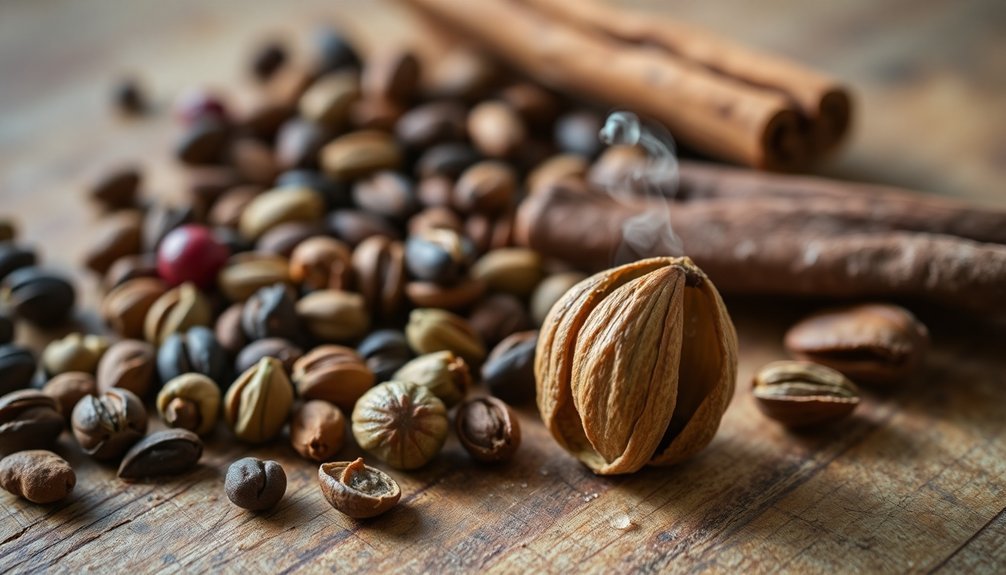
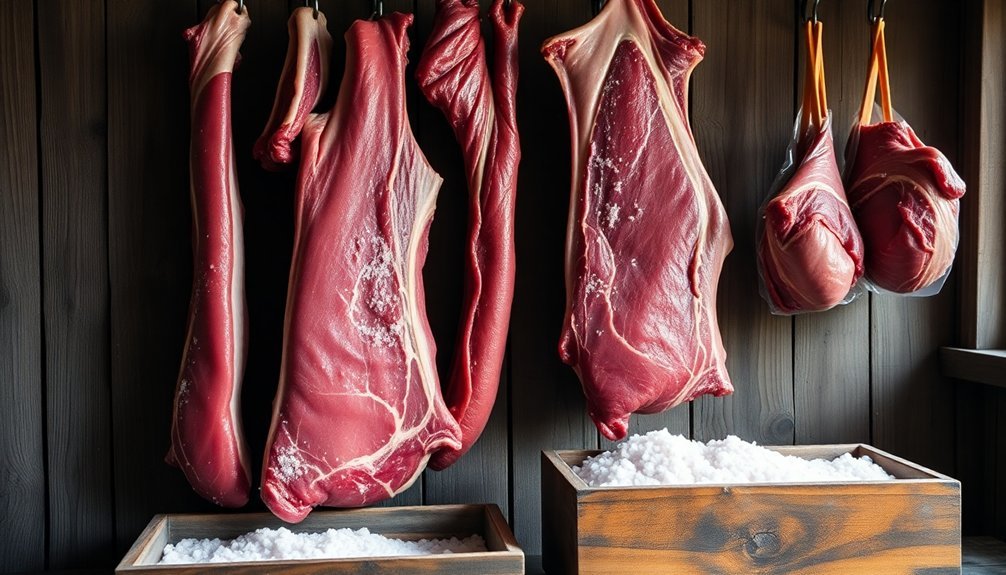
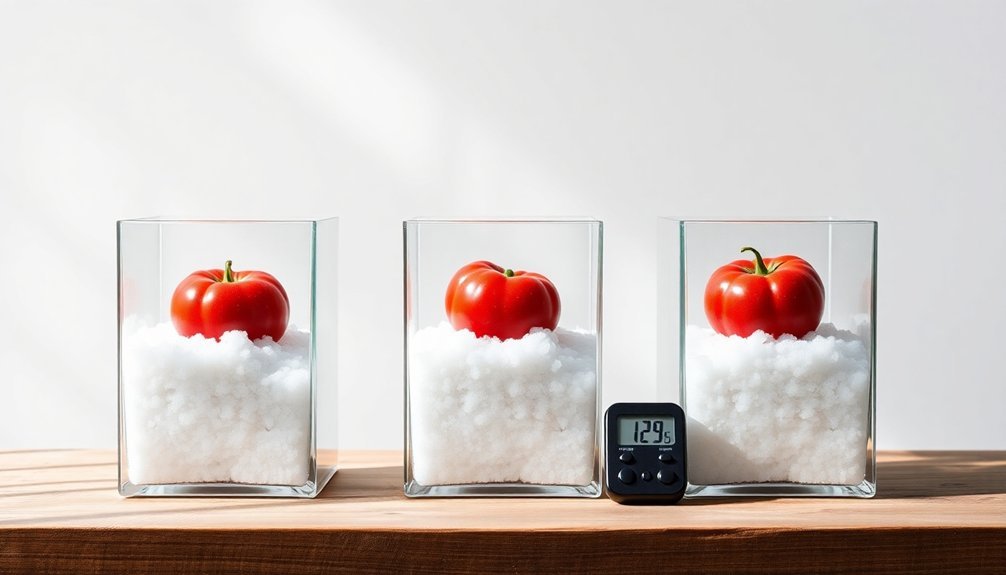
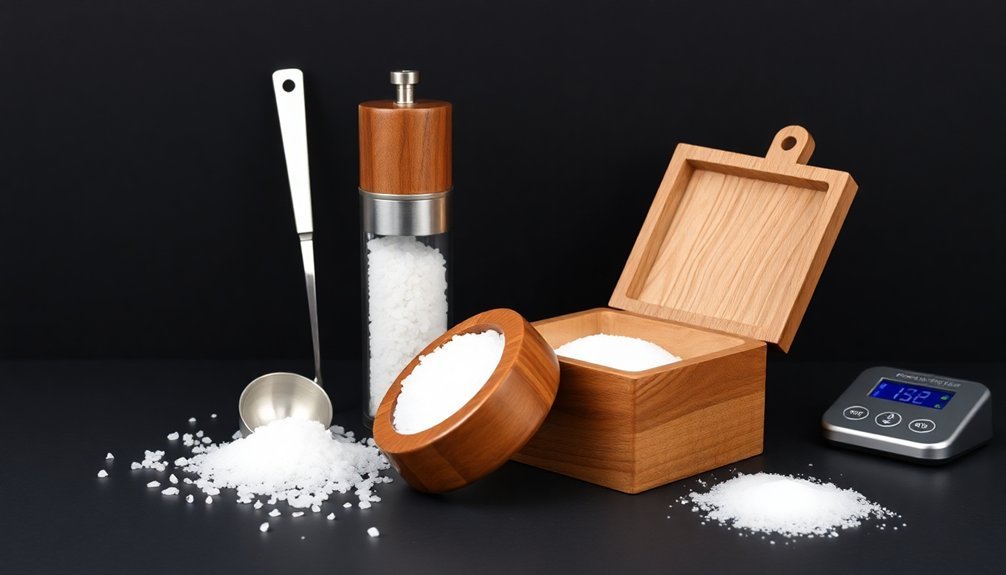
Leave a Reply